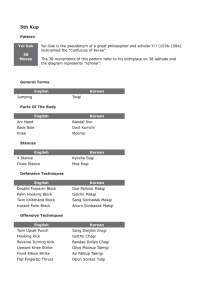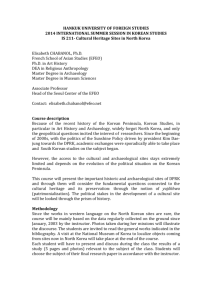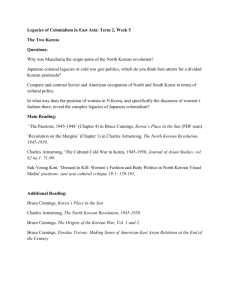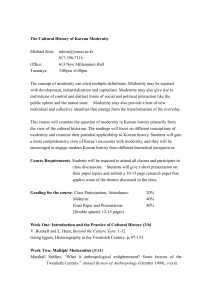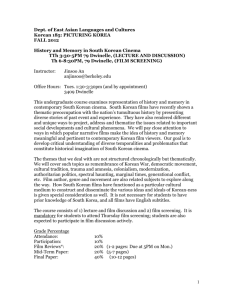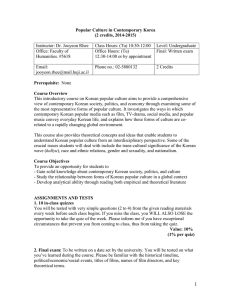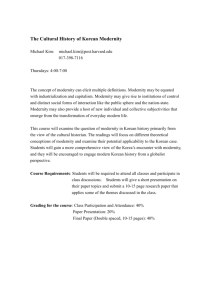G 5XXX - University of Southern California
advertisement
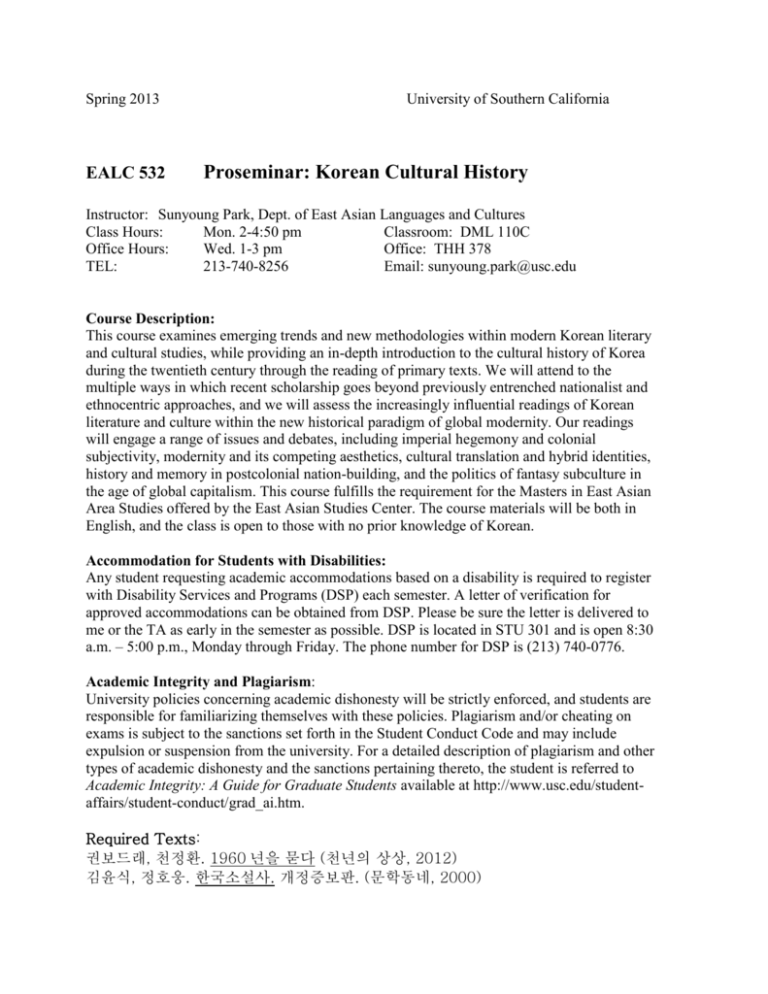
Spring 2013 EALC 532 University of Southern California Proseminar: Korean Cultural History Instructor: Sunyoung Park, Dept. of East Asian Languages and Cultures Class Hours: Mon. 2-4:50 pm Classroom: DML 110C Office Hours: Wed. 1-3 pm Office: THH 378 TEL: 213-740-8256 Email: sunyoung.park@usc.edu Course Description: This course examines emerging trends and new methodologies within modern Korean literary and cultural studies, while providing an in-depth introduction to the cultural history of Korea during the twentieth century through the reading of primary texts. We will attend to the multiple ways in which recent scholarship goes beyond previously entrenched nationalist and ethnocentric approaches, and we will assess the increasingly influential readings of Korean literature and culture within the new historical paradigm of global modernity. Our readings will engage a range of issues and debates, including imperial hegemony and colonial subjectivity, modernity and its competing aesthetics, cultural translation and hybrid identities, history and memory in postcolonial nation-building, and the politics of fantasy subculture in the age of global capitalism. This course fulfills the requirement for the Masters in East Asian Area Studies offered by the East Asian Studies Center. The course materials will be both in English, and the class is open to those with no prior knowledge of Korean. Accommodation for Students with Disabilities: Any student requesting academic accommodations based on a disability is required to register with Disability Services and Programs (DSP) each semester. A letter of verification for approved accommodations can be obtained from DSP. Please be sure the letter is delivered to me or the TA as early in the semester as possible. DSP is located in STU 301 and is open 8:30 a.m. – 5:00 p.m., Monday through Friday. The phone number for DSP is (213) 740-0776. Academic Integrity and Plagiarism: University policies concerning academic dishonesty will be strictly enforced, and students are responsible for familiarizing themselves with these policies. Plagiarism and/or cheating on exams is subject to the sanctions set forth in the Student Conduct Code and may include expulsion or suspension from the university. For a detailed description of plagiarism and other types of academic dishonesty and the sanctions pertaining thereto, the student is referred to Academic Integrity: A Guide for Graduate Students available at http://www.usc.edu/studentaffairs/student-conduct/grad_ai.htm. Required Texts: 권보드래, 천정환. 1960 년을 묻다 (천년의 상상, 2012) 김윤식, 정호웅. 한국소설사. 개정증보판. (문학동네, 2000) Park 2 대중서사쟝르연구회. 대중서사의 모든 것 1: 멜로드라마 (이론과 실천, 2007) Theodore Huges, Literautere and Film in Cold War South Korea (Columbia University, 2012) In addition to the above, please purchase, or use the library copy of, all fulllength novels assigned from Week 8 through Week 15. You may choose to read them either in Korean or in English (see the translated titles within brackets). For the rest of readings, they will be made available in time either in hard copy or on the blackboard. Requirements: 1. Class participation (10%) 2. Weekly response papers (10%): You are required to post a response paper (1-2 pages) on the Blackboard course webpage by the midnight of the day before the class. In this paper you are expected to outline the main theses of readings with critical commentary and raise study questions for class discussion. You are also strongly encouraged to read and respond to each other’s postings. 3. In-class presentations (10%): You will take turns initiating the day’s discussion by presenting your response to the readings. 4. Annotated Bibliography (10%): Each student will prepare a subjectoriented bibliography as a preparatory step for the final research paper by April 11. The bibliography should include critical annotations on at least five titles. For tips on how to write an annotated bibliography, you may reference the guideline at the Writing Center website of the University of North Carolina at Chapel Hill: http://www.unc.edu/depts/wcweb/handouts/annotated_bibliographies.html. 5. Final research paper (about 20 pages, 50%): You will choose your own topic after consultation with the instructor. You are required to use primary sources, literary or/and visual, for this research. Ideally, this paper will become the basis of your MA thesis, Ph.D. dissertation chapter, or even a publishable article. You will present the paper in class to receive peer feedback before the final submission. Syllabus Week 1. 1/14 Introduction Introduction to the class and organization meeting Week 2. 1/21 No Class—Martin Luther King’s Birthday Park 3 Week 3. 1/28 Origins of Modern Korean Literature 이광수, “문학이란 하오” [What Is Literature?] 염상섭, “만세전”[On the Eve of the Uprising] Karatani Kojin, “Confession as a System” in Origins of Modern Japanese Literature [E] 권보드래, 한국 근대 소설의 기원, 11-102 한국소설사, 1-114 Week 4. 2/4 Proletarian Internationalism vs. New Cosmopolitanism 송영, “용광로” [Blast Furnace]/ 강경애, “그 여자” Sunyoung Park, The Proletarian Wave, Chapters 2~4 Bruce Robbins, “Actually Existing Cosmopolitanism” 한국소설사, 115-236 Week 5. 2/11 Modernisms 박태원, “소설가 구보씨의 일일” [One Day in the Life of Kubo the Novelist] 채만식, “치숙” [My Innocent Uncle] Miriam Silverberg, “Japanese Modern Times” in Erotic Grotesque Nonsense: The Mass Culture of Japanese Modern Times, 13-47 Astradur Eyestensson, The Concept of Modernism, 8-49 한국소설사, 237-287 Week 6. 2/18 No Class—President’s Day Week 7. 2/25 Overcoming Modernity in the Greater East Asian War 김동리, “무녀도” [The Shaman Painting]/ 김남천, “맥” [Barley] Takeuchi Yoshimi, “Overcoming Modernity” in What Is Modernity? 103-148 Sunyoung Park, “Everyday Life as Critique: Kim Namch’on’s Literary Experiments 1934-1943” Serk-Bae Suh, “The Location of ‘Korean’ Culture: Ch’ae Chaesŏ and Korean Literature in a Time of Transition” Week 8. 3/4 Culture in the Liberation Space 염상섭, 효풍 Theodore Hughes, “Visible and Invisible States: Liberation, Occupation, Division” in Literature and Film in Cold War South Korea, 61-90 Raymond Williams, Marxism and Literature, 108-144 한국 소설사, 289-346 Week 9. 3/11 Postwar Youth Culture Park 4 최인훈, 광장[The Square] 권보드래 & 천정환, 1960 년을 묻다. 65-110 and 173-375 Theodore Hughes, Literature and Film in Cold War South Korea, 91-204 Fredric Jameson, “Periodizing the 60s” 한국 소설사, 347-420 Week 10. 3/18 No Class—Spring Recess Week 11. 3/25 Utopian and Fantastic Imagination under Developmental Dictatorship 조세희, 난장이가 쏘아올린 작은 공 [The Dwarf] China Miéville, “Marxism and Fantasy: An Introduction” 김소영, 근대성의 유령들. Week 12. 4/1 The Minjung Cultural Movement 이문열, 사람의 아들. Kenneth M. Wells, South Korea's Minjung Movement, 87-118, 167-178 한국 소설사, 421-518. Film: Im Kwont’aek, T’aebaek sanmaek (1988) Week 13. 4/8 Melodrama and Modernity 신경숙, 엄마를 부탁해 [Please Look after Mom] Peter Brooks, The Melodramatic Imagination, xiii-23 대중서사학회. 대중서사쟝르의 모든 것 1. 멜로드라마 Week 14. 4/15 The Postmodern Moment Kim Youngha, 나는 나를 파괴할 권리가 있다 [I Have the Right to Destroy Myself] Jean-François Lyotard, “Answering the Question: What is Postmodernism?” Brian McHale, “From Modernist to Postmodernist Fiction: Change of the Dominant,” in Postmodernist Fiction, 3-11 Jean Baudrillard, “The Precession of Simulacra,” in Simulacra and Simulation, 1-43. Film: Hong Sangsu, The Day a Pig fell into a Well (1996) Week 15. 4/22 Post-IMF Surrealism 박민규, 카스테라 Andre Breton, “Manifestoes of Surrealism” Donna Haraway, "A Cyborg Manifesto Science, Technology, and SocialistFeminism in the Late Twentieth Century." Park 5 John Clarke, Stuart Hall, Tony Jefferson, and Brian Roberts, “Subcultures, Cultures, and Class.” Martin Roberts, “Notes on the Global Underground: Subcultures and Globalization.” Week 16. 4/28 Student Presentations


